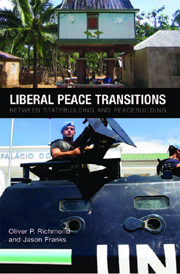Book contents
- Frontmatter
- Contents
- Acknowledgements
- List of Acronyms
- Introduction: a Framework to Assess Liberal Peace Transitions
- 1 Cambodia: Liberal Hubris and Virtual Peace
- 2 Bosnia: Between Partition and Pluralism
- 3 Liberal Peace in East Timor: the Emperors' New Clothes?
- 4 Co-opting the Liberal Peace: Untying the Gordian Knot in Kosovo
- 5 Building/Rejecting the Liberal Peace: State Consolidation and Liberal Failure in the Middle East
- Conclusion: Evaluating the Achievements of the Liberal Peace and Revitalising a Virtual Peace
- Select Bibliography
- Index
4 - Co-opting the Liberal Peace: Untying the Gordian Knot in Kosovo
Published online by Cambridge University Press: 12 September 2012
- Frontmatter
- Contents
- Acknowledgements
- List of Acronyms
- Introduction: a Framework to Assess Liberal Peace Transitions
- 1 Cambodia: Liberal Hubris and Virtual Peace
- 2 Bosnia: Between Partition and Pluralism
- 3 Liberal Peace in East Timor: the Emperors' New Clothes?
- 4 Co-opting the Liberal Peace: Untying the Gordian Knot in Kosovo
- 5 Building/Rejecting the Liberal Peace: State Consolidation and Liberal Failure in the Middle East
- Conclusion: Evaluating the Achievements of the Liberal Peace and Revitalising a Virtual Peace
- Select Bibliography
- Index
Summary
Introduction
The liberal peace framework, when placed in the context of peacebuilding and statebuilding operations, aims to balance an empowerment of the individual with institutions of governance designed to guide the behaviour of that individual. Yet, as we show in the following chapter, liberal peacebuilding, even on the scale employed in Kosovo, is much more susceptible to local co-option than often thought, particularly where one group can adopt the language of the liberal peace and thereby gain strong support and credibility within and from the international community. Yet, the outcome of this process does not necessarily conform to the expectations of peacebuilders, as the process becomes one of marginalisation for other identity groups and their agendas. As a result, this may perpetuate the initial conflict that led to the arrival of the peace operation in the first place.
In June 1999, the United Nations Security Council (UNSC) adopted Resolution 1244, which authorised the creation of the UN Interim Administration in Kosovo (UNMIK). Underwritten by the principal tenets of the liberal peace, the Kosovo ‘trusteeship’ was to be the most ambitious UN statebuilding project to date. It has so far received 2 billion euros in donor funding, is comprised of personnel from the UN, OSCE and Civilian Police (CIVPOL), and is supported by KFOR, a NATO-led peacekeeping force of 50,000 troops. For a geographical region of only ten thousand square kilometres and with a population of barely 1.9 million, it was an undertaking of impressive proportions.
- Type
- Chapter
- Information
- Liberal Peace TransitionsBetween Statebuilding and Peacebuilding, pp. 114 - 148Publisher: Edinburgh University PressPrint publication year: 2009



